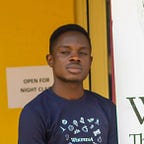Open GLAM in Nigeria — developments and opportunities for open access
With a population of 200 million people, over 250 ethnic groups and more than 500 distinct languages, Nigeria is Africa’s most populous and culturally diverse nation.
Nigeria has a rich heritage of creative works, starting from the Nok civilization of Northern Nigeria, which flourished between 1500 BC and 200 AD, and produced life-sized terracotta figures that are some of the earliest known sculptures in Sub-Saharan Africa. Other cultural works include the bronze works of the Yoruba and Igbo kingdoms. During the colonial era some of these artifacts and artworks were looted or extracted by European colonizers who brought them into European museums.
Since Nigeria’s independence in 1960, many galleries, libraries, archives and museums (GLAMs) have been established by the government, forming the bulk of Nigeria’s cultural institutions. In recent years, a number of private cultural bodies (predominantly art galleries) have also been established.
Open practices in Nigeria’s GLAM sector are relatively new, and currently lack visibility and widespread adoption. It’s a growing movement and a large part of the efforts are driven by the Wikimedia community in Nigeria. Some of the partnerships the Wikimedia community in Nigeria has include the University of Lagos Library, Nimbe Adedipe Library (Federal University of Agriculture, Abeokuta) and the Kenneth Dike Library (University of Ibadan).
The Wikimedia community in Nigeria works doing campaigns and content drives that promote free use and open access to digital cultural heritage.
Training librarians
The campaign #1lib1ref, which stands for “one librarian, one reference” is an international campaign that encourages librarians to contribute to open knowledge by adding sources and references to Wikipedia, including sources from the library’s collections. In Nigeria, the Wikimedia community has trained librarians from different libraries to use Wikipedia as a tool for promoting open knowledge.
The Wikimedia User Group Nigeria also did a training on Wikipedia and an introduction to Wikidata to librarians at the Kenneth Dike Library (University of Ibadan) and Nimbe Adedipe Library (Federal University of Agriculture, Abeokuta).
The African Library and Information Association and Institutions (AfLIA) organized the African Librarians week in collaboration with Wikimedia to engage library communities to help fill key gaps in African content on Wikipedia by adding content and missing references to articles about Africa on Wikipedia. AfLIA in partnership with African Storybook (an initiative of SAIDE) and the National Library of Nigeria organized a workshop on the use of technology to create and translate children’s stories for literacy promotion. The workshop helped participants to clearly understand open licensing and how it drives the building of digital libraries as part of the process of promoting Nigeria’s documentary heritage.
Photo contests and content drives
The Goethe Institut has a center in Lagos. The Institut has partnered with the Wiki Loves Women Project to encourage the contribution of quality information on African women to be published on, and made widely available via, Wikipedia.
The Wikimedia User Group Nigeria has also helped organize locally some of the international Wikimedia photo contests such as Wiki Loves Africa, Wiki Loves Monuments, and Wiki Loves Earth. This has helped release thousands of images under open and free licenses. These photo contests have helped to showcase the historical places of interest, culture and living practices of the people of Nigeria. As the popular saying goes, a picture is worth a thousand words. This is a selection of photos from Nigeria:
Wikipedian in Residence
Another important program was opened in 2018, when the Wikimedia User Group Nigeria established a Wikipedian in Residence project at Goge Africa to facilitate the sharing of resources with the Wikimedia community and with the public. Goge Africa is a culture-oriented non-governmental organization in Nigeria. Its TV program is a blend of travel, culture, festivals, carnivals, arts, fashion, food, music, dance, and real-time experiences.
Challenges for open access in Nigeria
The greatest challenge to promoting free and open access to digital cultural heritage in Nigeria is awareness. Many cultural institutions in Nigeria are unaware of open practices in promoting access and reuse. For those who are aware but undecided, it still demands a great deal of advocacy to convince them to give their first steps. Other challenges include bureaucratic bottlenecks in setting up open practices at some cultural institutions, securing funding for large scale digitization projects at GLAMs that are willing to share their works under open licenses, and the relative scarcity of modern equipment for undertaking digitization.
To increase open GLAM practice in Nigeria, it is essential to develop a strategic plan that intensifies open access advocacy, whilst working to secure partnerships and funding that accelerates and supports open access to Nigeria’s rich digital cultural heritage.
This story was written by Isaac Oloruntimilehin through an open call funded by Creative Commons Open GLAM Platform. This is part of a series of articles that will be published in the Open GLAM Medium publication, that have been supported with the goal of showcasing stories around the world on Open GLAM. Find out more here.
